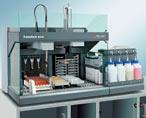
The Landeslabor Berlin-Brandenburg (LLBB) in Frankfurt, Germany, is dedicated to the protection of human and animal safety, health and welfare, and has chosen Tecan’s liquid handling workstations to help monitor diseases in cattle, including an extensive testing program for the eradication of Bovine Herpesvirus 1 (BHV-1). “By using Tecan’s process automation solutions for fully automated sample processing and high throughput ELISA, our laboratory is able to process close to 7,000 samples per day for BHV-1 testing at peak times. This has greatly enhanced the efficacy and reliability of the LLBB’s diagnostic service,” explained Sabine Thalheim at LLBB’s Department of Infectious Disease Testing.
Once samples arrive in the laboratory, they are archived and organized into sample worklists by Tecan Genesis RSP™ platforms. This is aided by direct communication between the laboratory’s LIMS database and the customer-specific DisCo Tool 2 software, using a PosID™ module and barcode scanners for sample identification. Samples are then transferred to a Freedom EVO® 200 workstation for ELISA tests, including the IDEXX HerdChek®* IBR gE Antibody kit for BHV-1 testing. The platform has been specifically configured to meet the laboratory’s high throughput needs, processing up to 70 ELISA plates per day. Five hotels provide loading capacity for 45 plates in one run, and integration of a Sunrise™ microplate absorbance reader and a Power Washer 384™ allow fully automated ELISA processing, increasing the laboratory’s throughput capabilities.
